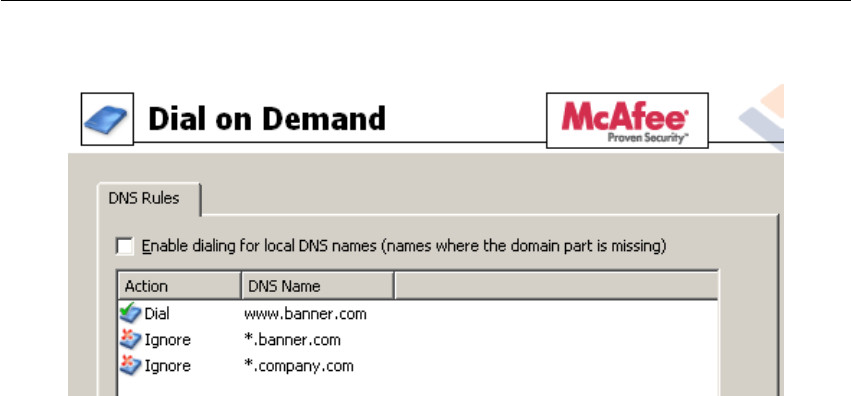
16.2 Demand Dial
229
Figure 16.3 Demand dial rules (for responses to DNS queries)
In this section you can create a rule list of DNS names.
Either whole DNS name or only its end or beginning completed by an asterisk (
*
) may be
entered. An asterisk may stand for any number of characters.
In Actions you can select from the Dial or Ignore options. Use the second option to block
dialing of the line in response to a query on the DNS name.
Rule lists are searched downwards (rule order can be modified with the arrows at the
right side of the window). When the system detects the first rule that meets all require-
ments, the desired action is executed and the search is stopped. All DNS names missing
a suitable rule will be dialed automatically by DNS Forwarder when demanded.
The Dial action can be used to create complex rule combinations. For example, dial can
be permitted for one name within the domain and denied for the others (see the figure).
Dial of local DNS names
Local DNS names are names of hosts within the domain (names that do not include
a domain).
Example: The local domain is called company.com. The host is called pc1. The full
name of the host is pc1.company.com whereas local name in this domain is pc1.
Local names are usually stored in the database of the local DNS server (in this
example, the names are stored in the hosts file at the WinRoute host that uses DNS
Forwarder). Set by default, DNS Forwarder does not dial these names as names are
considered non-existent unless they can be found in the local DNS database.
If the primary server of the local domain is located outside of the local network,
it is necessary that the DNS Forwarder also dials the line if requests come from
these names. Activate the Enable dialing for local DNS names option in the Other
settings tab to enable this (at the top of the Demand Dial dialog window). In other
cases, it is recommended to leave the option disabled (again, the line can be dialed
undesirably).


















